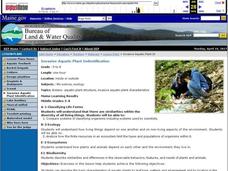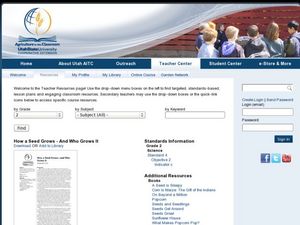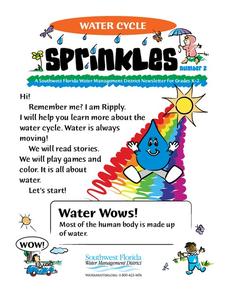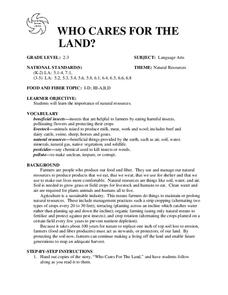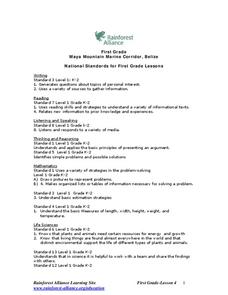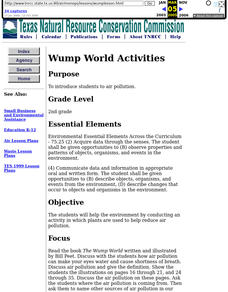Curated OER
Air, Air Everywhere! Lesson 2: Acid Rain
Middle school environmentalists record the pH of four different liquids, including two aerosol cleaning products. They liken the products to acid rain and speculate in writing which might affect the human respiratory system. Although...
Curated OER
Invasive Aquatic Plant Identification
Students observe aquatic plants and animals and identify their systems. In this plants and animals lesson plan, students compare systems of organisms and orally express how plants and animals rely on each other.
Curated OER
How a Seed Grows and Who Grows It
First graders explore biology by viewing PowerPoint presentations in class. In this plant life lesson, 1st graders identify the life cycle of a plant and how to properly plant a seed outside. Students view a movie about plant life and...
Curated OER
Little Red Hen
First graders explore biology by identifying plant anatomy in class. In this botany lesson, 1st graders read the book The Little Red Hen and identify the methods used in order to grow successful plants. Students discuss other ways people...
Curated OER
Mini-Ponds
In this mini pond worksheet, learners create a mini-pond ecosystem with soil, water, and plant life. Students let their ecosystem sit for a day and they observe a sample the next day. Learners identify all the pond water microorganisms...
Curated OER
Do You Need What I Need?
Student identify the basic human needs. In this life science instructional activity, 3rd graders compare the needs of plants, animals and humans. They apply what they have learned by playing a survival team game.
Curated OER
Soil Scrolls
Third graders examine soil samples and explore the what happens in each layer of the subsoil. They work in cooperative groups to create a scroll that shows what takes place in each layer, and discuss why much of the activity is in the...
Curated OER
Ecosystems - Plants and Animals Together
Students study the biotic and abiotic factors of an environment. In this exploratory lesson students examine the different trophic levels and how organisms are connected.
Curated OER
Animals
First graders study the basic needs of animals and compare them to human needs. They make bird feeders using milk carton and pine cones. They review the basic needs of food, water, air, and shelter and discuss what happens when animals...
Curated OER
Cell Energy-Bubbling Plants
Students discuss the process of photosynthesis in plants and that oxygen is produced as a by product. They observe underwater Elodea plants "breathing" in a hands-on activity. After setting up the experiment, they observe the plant for...
Curated OER
Lets Think About...Plants
Students bring in various vegetables and make friendship soup. They plant seeds and discuss the things plants need to grow and thrive.
Curated OER
Case of the Missing Pumpkin
Students explore the process of decomposition in plants. For this plant biology lesson, students use a cleaned out pumpkin and observe how the decomposition process takes place. Students write down adjectives to describe the pumpkin.
Curated OER
Sprinkles
In this science worksheet, students read a water trip rebus. Pictures replace several of the words in the article. They color a picture of the water cycle and add arrows to show the direction the water is moving. Students draw a picture...
Curated OER
WHO CARES FOR THE LAND?
Students explore the importance of natural resources. They are given copies of the story, "Who Cares For The Land," and students follow
along as the teacher reads it. Students identify the key points in the story. (Soil, water and air...
Curated OER
3rd grade life science
In this life science activity, 3rd graders answer multiple choice questions about plants, birds, habitats, and more. Students complete 20 questions.
Curated OER
Who Takes Care of the Maya Forest Corridor?
First graders study the animals in the Maya Forest Reserve. In this conservation lesson plan, 1st graders create a graph to compare the environment of animals to their own. They design a 3D model of these two environments.
Curated OER
Habitat Basics
First graders get out and explore two different habitats to examine how each one meets the needs of the plants and animals that dwell there. They discuss what they've learned about animal habitats as they explore the outdoor environment....
Curated OER
Plants and Animals in the Local Environment
In this plant and animal environment worksheet, students draw 3 animals or plants in each circle to identify which habitat they belong to: air, land, or water.
Curated OER
The Web of Life
Students demonstrate the interrelationships of animals and plants. In this ecology lesson, students discuss the things plants and animals need for survival and study the glacier food chain. Students simulate the web of life by using a...
Curated OER
Forest Friends Forever
Students investigate how to use the senses to gather information about objects such as size, shape, color, texture, sound, position, and change (qualitative observations are utilized throughout this lesson). They investigate and explain...
Curated OER
Wump World
Second graders read ead the book The Wump World written and illustrated by Bill Peet. Discuss with the students how air pollution can make your eyes water and cause shortness of breath. Students discuss air pollution and give the...
Curated OER
What is in Soil?
Fourth graders identify and examine the components that make up soil. Individually, they use a magnifying glass to identify the organic and inorganic material in their soil sample. To end the lesson, they record the differences in the...
Curated OER
Life Cycles
Using computers, Students work in small groups and progress through the roles of Explorer, Researcher, Designer, and Evaluator as they study the life cycle of plants, insects, butterflies and frogs.
Curated OER
Learning From Leaves: Adaptations To Differing Light Levels
Students, in groups, examine plants with different light levels. They are given plants from a tropical and desert region. They write a hypothesis at the beginning of the experiment.



